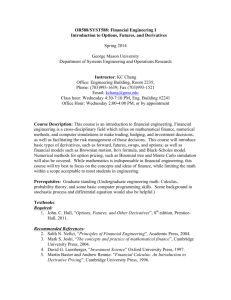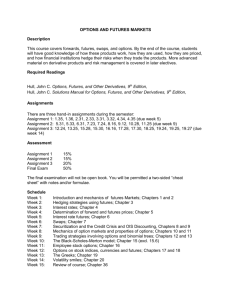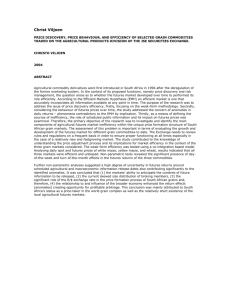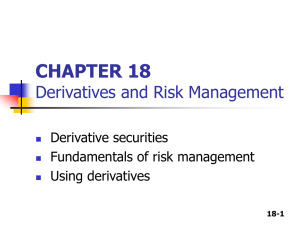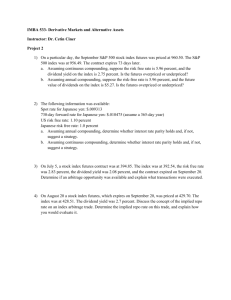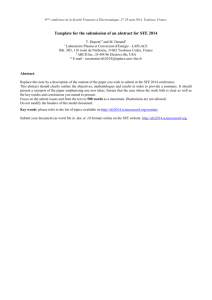Australian 90 Day Bank Accepted Bill Futures and Options
advertisement
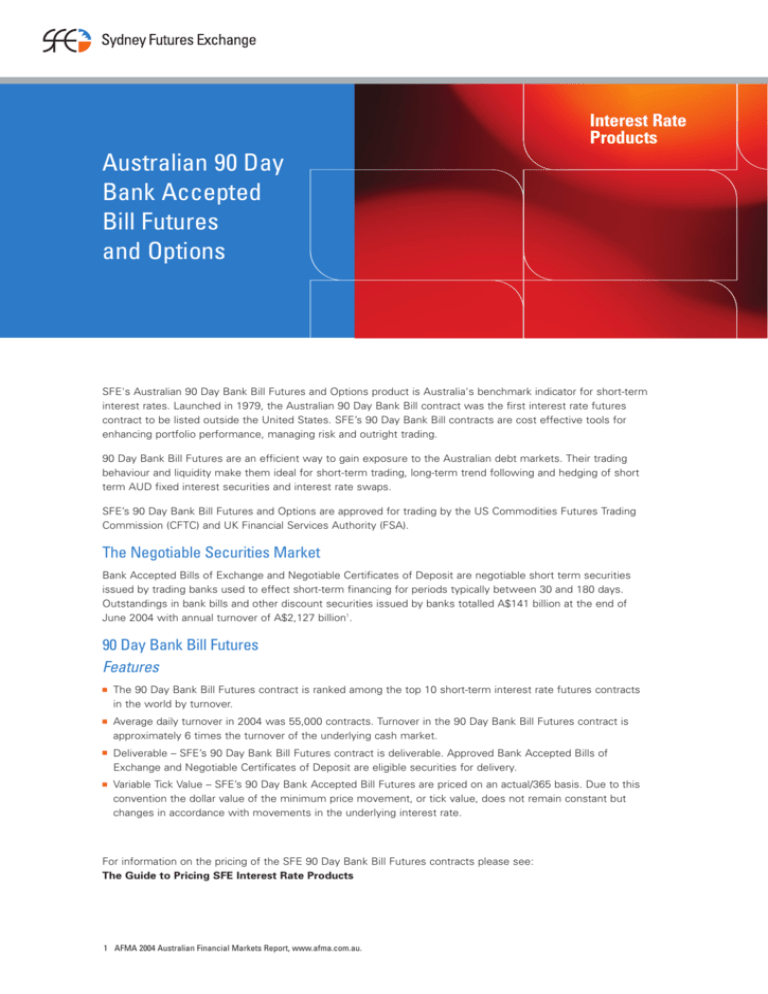
Interest Rate Products Australian 90 Day Bank Accepted Bill Futures and Options SFE's Australian 90 Day Bank Bill Futures and Options product is Australia's benchmark indicator for short-term interest rates. Launched in 1979, the Australian 90 Day Bank Bill contract was the first interest rate futures contract to be listed outside the United States. SFE’s 90 Day Bank Bill contracts are cost effective tools for enhancing portfolio performance, managing risk and outright trading. 90 Day Bank Bill Futures are an efficient way to gain exposure to the Australian debt markets. Their trading behaviour and liquidity make them ideal for short-term trading, long-term trend following and hedging of short term AUD fixed interest securities and interest rate swaps. SFE’s 90 Day Bank Bill Futures and Options are approved for trading by the US Commodities Futures Trading Commission (CFTC) and UK Financial Services Authority (FSA). The Negotiable Securities Market Bank Accepted Bills of Exchange and Negotiable Certificates of Deposit are negotiable short term securities issued by trading banks used to effect short-term financing for periods typically between 30 and 180 days. Outstandings in bank bills and other discount securities issued by banks totalled A$141 billion at the end of June 2004 with annual turnover of A$2,127 billion1. 90 Day Bank Bill Futures Features ■ The 90 Day Bank Bill Futures contract is ranked among the top 10 short-term interest rate futures contracts in the world by turnover. ■ Average daily turnover in 2004 was 55,000 contracts. Turnover in the 90 Day Bank Bill Futures contract is approximately 6 times the turnover of the underlying cash market. ■ Deliverable – SFE’s 90 Day Bank Bill Futures contract is deliverable. Approved Bank Accepted Bills of Exchange and Negotiable Certificates of Deposit are eligible securities for delivery. ■ Variable Tick Value – SFE’s 90 Day Bank Accepted Bill Futures are priced on an actual/365 basis. Due to this convention the dollar value of the minimum price movement, or tick value, does not remain constant but changes in accordance with movements in the underlying interest rate. For information on the pricing of the SFE 90 Day Bank Bill Futures contracts please see: The Guide to Pricing SFE Interest Rate Products 1 AFMA 2004 Australian Financial Markets Report, www.afma.com.au. Quarterly and Serial Options ■ Both quarterly and serial options are available for the 90 Day Bank Accepted Bill Futures. Quarterly options expire in the same calendar month as the underlying futures contract. Serial options are listed in non-financial quarter months. ■ Pre-negotiated Business Rules are applicable to quarterly and serial 90 Day Bank Bill Options. These rules provide Participants the opportunity to facilitate client business off-market prior to disclosing and then crossing orders on SFE's trading platform SYCOM®. Trading SFE Bank Bill Futures and Options ■ Trading in SFE’s 90 Day Bank Bill Futures and Options is conducted ‘On-market’ via SFE’s electronic platform SYCOM® and ‘Off-market’ through ‘Exchange for Physicals’ transactions. ■ Strip trading functionality is available for 90 Day Bank Bill Futures versus the spot 3 Year Treasury Bond Futures contract. A Bank Bill versus 3 Year Bond Strip Trade involves simultaneously buying/selling the same volume for between 5 and 20 consecutive Bank Bill Futures and selling/buying the 3 Year Treasury Bond Futures at a predetermined ratio. ■ Spread trading functionality is available for calendar and inter-commodity spreads. ■ Attractive spread concessions are available on calendar spreads as well as inter-commodity spreads for offsetting positions held in the 3 Year and 10 Year Treasury Bond Futures and 3 Year and 10 Year Interest Rate Swap Futures and 30 Day Interbank Cash Rate Futures contracts. Benefits of Exchange Traded Markets Trading at SFE offers the following specific benefits of exchange traded markets, such as: ■ Price transparency and liquidity ■ Immediate execution and confirmation ■ Reduction of counter-party risk ■ Centralised clearing supported by a clearing guarantee. Contract Specification for Australian 90 Day Bank Accepted Bill Futures and Options CONTRACT 90 DAY BANK ACCEPTED BILL FUTURES Commodity Code IR OPTIONS ON 90 DAY BANK ACCEPTED BILL FUTURES IR Option Style – American Contract Unit A$1,000,000 face value 90 day bank accepted bills of exchange or EBAs2. One unit of futures contract for a specified contract month on the Sydney Futures Exchange. Contract Months March/June/September/December up to twenty quarter months or five years ahead. Quarterly Options Put and Call options available on futures contracts up to six quarter months ahead. Serial Options Listed in non-financial quarter months with two serial option months listed at all times. Put and call options are available based on a futures contract which expires in the financial quarter month immediately following the respective serial month. Minimum Price Movement Prices are quoted in yield per cent per annum Quoted in yield per cent per annum in multiples in multiples of 0.01 per cent. For quotation of 0.005 per cent. purposes the yield is deducted from an index of 100. The minimum fluctuation of 0.01 per cent equals approximately $24 per contract, varying with the level of interest rates. Exercise Prices – Set at intervals of 0.25 per cent per annum yield. New option exercise prices created automatically as the underlying futures contract price moves. Contract Expiry3 12.00 noon on the business day immediately prior to settlement day. Quarterly Options At 12:30pm on the Friday one week prior to the settlement day for the underlying futures contract. Serial Options At 12.30pm on the first Friday of the Serial Option month. Settlement Method Ten bank accepted bills or EBAs or ten bank negotiable certificates of deposit (NCDs) or ECDs each of face value A$100,000, or two bank accepted bills or EBAs or bank negotiable certificates of deposit or ECDs each of face value A$500,000 or one bank accepted bill or EBA or bank negotiable certificate of deposit or ECD of face value A$1,000,000 maturing 85-95 days from settlement day. Options may be exercised on any business day up to and including the day of expiry. In-the-money options are automatically exercised at expiry unless abandoned. Trading Hours3 5.08pm to 7.00am and 8.28am to 4.30pm (during US daylight saving time) 5.08pm to 7.30am and 8.28am to 4.30pm (during US non daylight saving time) As for 90 Day Bank Bill Futures contract. Settlement Day The second Friday of the delivery month. – 2 Electronic Bank Acceptance and Electronic Certificate of Deposit (EBAs and ECDs) are electronically recorded debt obligations as defined within the definition of ‘Dematerialised Security’ in the Operating Manual of Austraclear Limited. Buyers and Sellers should note the following in relation to the two types of bills: (i) an EBA is not the legal equivalent of a bill of exchange under the Bills of Exchange Act and accordingly delivery of an EBA may not be the same as delivery of a bank accepted bill of exchange under the Bills of Exchange Act. (ii) the Bills of Exchange Act is a Commonwealth Act which grants and guarantees rights of title, enforcement and negotiability to instruments which qualify as bills of exchange under the Act. (iii) an EBA is not a bill of exchange unless and until it is uplifted from the Austraclear Limited system in accordance with the Regulations and Operating Manual of Austraclear Limited AND the uplifted EBA satisfies the requirements of a bill of exchange under the Bills of Exchange Act. It is expected that in most cases the subject of delivery under the contract will be an EBA, however where a Seller intends to deliver an EBA and a Buyer requires the delivery of a bill of exchange in accordance with the Bills of Exchange Act, the Seller shall be required to uplift the EBA and relodge a bill of exchange in accordance with the Bills of Exchange Act as required by the Market By-Laws. 3 Unless otherwise indicated, all times are Sydney times. US daylight saving begins first Sunday in April and ends last Sunday in October. Australian 90 Day Bank Bill Futures and Options Data Vendor Access Codes* 90 DAY BANK BILLS FUTURE 90 DAY BANK BILLS OPTION 90 DAY BANK BILLS BAB STRIP BASIS YT BANKS 90 DAY BANK BILLS APPROVED SFE Code IR IR ST – TeleCommunication Systems 2YBA – – – Bloomberg IRA<CMDTY> IRA<CMDTY> OMON W1Z3 <CMDTY> – Bourse Data IR IR – – CQG HB HB – – Derivatives.com.au IRMMYY IRMMYYSSSS(C or P) – – FT Interactive Data IRmy IRmytypestrike STmy – FT Interactive Data/Comstock 17mIRmy 17mIR_my_sss 17mSTmy – FutureSource/esignal Day: AIR Night: ANR Full: ASR PAIR/CAIR – – Infoscan FA90D2 – IRESS Market Technology IRmy IRmyXssss STmy – MarketCast IRym IRymssss – – MarketSource Day: IR1/IR1.Q Night: SR1/SR1.Q – – – Moneyline Telerate Codes Day: au@IR.1 Night: au@SR.1 Full: au@IRC.1 Day: au@IR.1 Night: au@SR.1 Day:au@ST.1 Night:au@TS.1 Full: au@STC.1 – Moneyline Telerate Pages Day: 6181/88 Night: 6191/90 22709-12 – 22924 Orange Bank Bills – – – Reuters Full: 0#YBA: Night: 0#1YBA: Day: 0#2YBA: Day: 0#2YBAmy+ Night: 0#1YBAmy+ Full: 0#YST: Night: 0#1YST: Day: 0#2YST: SFE/DET4 Telekurs 3,IRym,359 3,IRymcstrike,359 3,IRympstrike,359 – – Thomson Financial IR/YYM IR/YYM ST/YYM – – * Data vendor codes are current as at May 2005. A current list of codes is available at www.sfe.com.au. Contact Maurice Farhart Senior Manager Interest Rate and Currency Products Australia: +612 9256 0483 mfarhart@sfe.com.au Disclaimer This document provides general information only. The information is subject to change. It is not investment advice and readers should seek their own professional advice in assessing the effect of the information in their circumstances. SFE Corporation Limited and its related corporations (SFE) accept no liability for errors or omissions, including negligence, or for any damage loss or claim arising from reliance on the information. This document is not a substitute for the relevant SFE Operating Rules and in the case of inconsistency, the Operating Rules prevail. Futures and options trading involves the potential for both profits and losses and only licensed brokers and advisers can advise on this risk. 11.05

